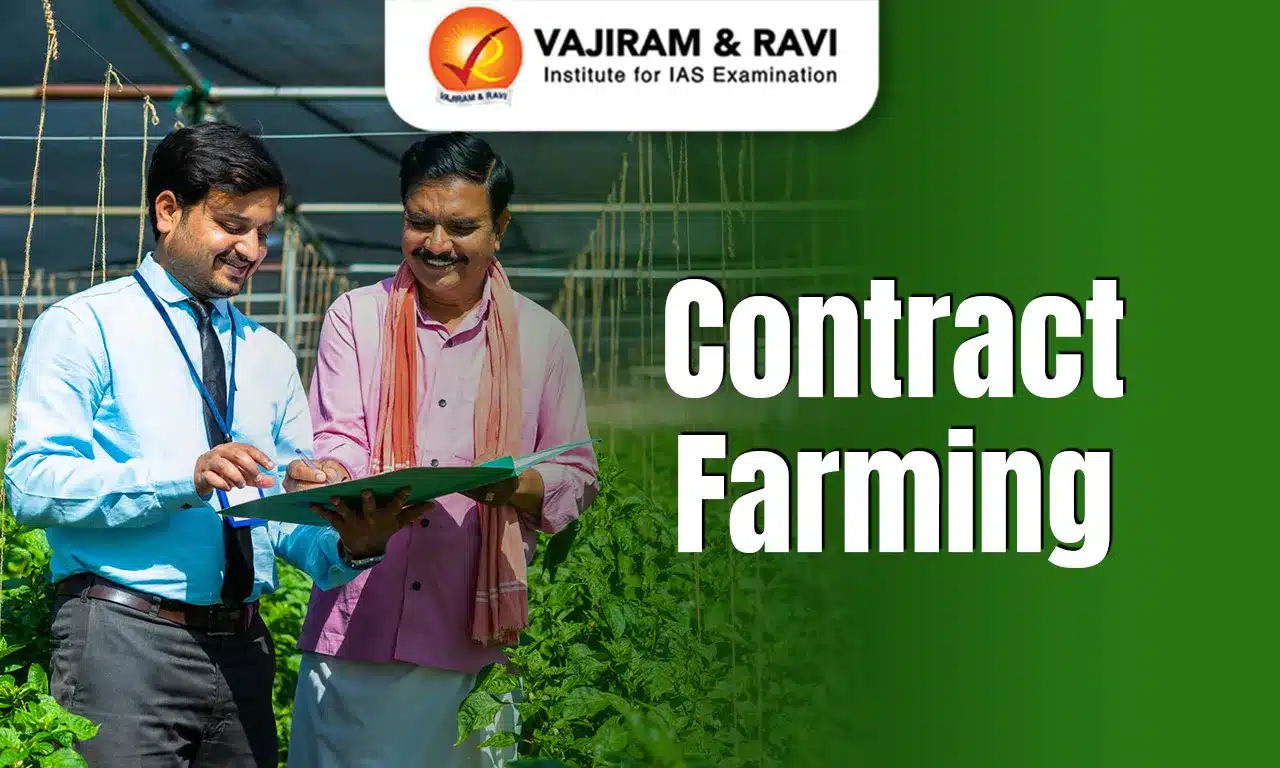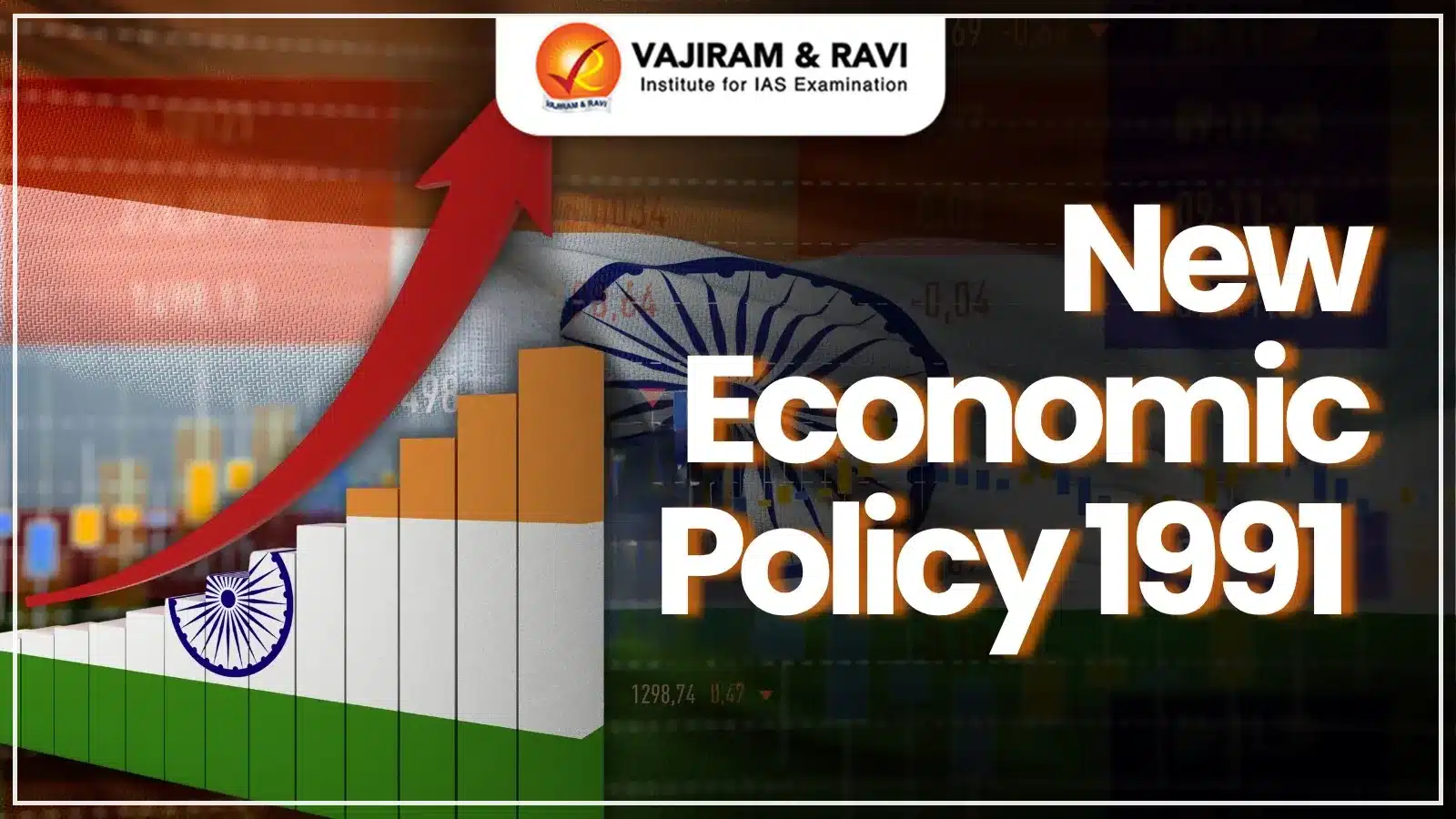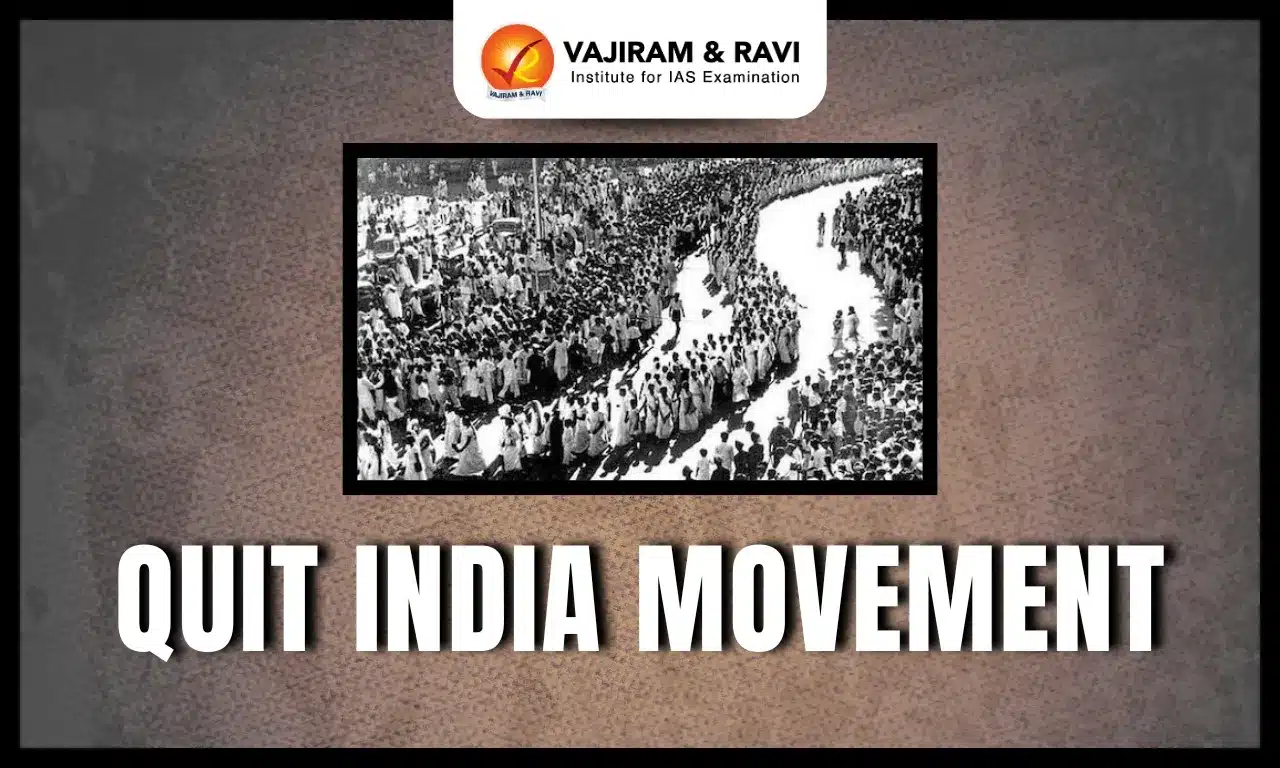Contract farming is an agreement between farmers and buyers for the production and supply of agricultural produce under predetermined terms. It ensures a steady income, boosts private investment, supports food processing, and expands cultivation. The five models—Informal, Intermediary, Multipartite, Centralized, and Nucleus Estate—address varied agricultural needs.
While it drives economic growth and sustainability, concerns include farmer exploitation, dependency, and legal vulnerabilities. In India, the APMC Act (2003) and Model Act (2018) regulate practices. However, targeted reforms can enhance equity, efficiency, and farmer empowerment.
What is Contract Farming?
According to FAO, Contract farming can be defined as ‘an agreement between farmers and processing and/or marketing firms for the production and supply of agricultural products under forward agreements, frequently at predetermined prices.’
- It is an agreement between the farmers and the buyers that states the terms and conditions of the production and market of agricultural commodities.
- The effectiveness of this contractual arrangement depends upon three factors, i.e. Market provision, Resource provision, and Management specifications.
Objectives of Contract Farming
The objective of contract farming in India is to ensure a steady income for small farmers, promote market-focused crop selection, boost private investment in agriculture, support food processing, ensure raw material supply for industries, reduce government price interventions, and encourage crop diversification and agribusiness awareness.
Types of Contract Farming
Types of contract farming, as outlined by the FAO, depend on product type, farmer needs, sponsor resources, and relationships. The five primary models are the Informal, Intermediary, Multipartite, Centralized, and Nucleus Estate models, each with unique features and applications. These are explained below:
- Informal Model: This model operates through informal, seasonal production contracts, typically managed by small companies or individual entrepreneurs. It often relies on government support for credit and extension services but carries higher marketing risks.
- Most contracts in India follow this model.
- Intermediary Model: In this model, sponsors establish links with farmers through intermediaries. While it facilitates wider reach, sponsors risk losing control over production quality, pricing, and processes.
- Multipartite Model: This model involves collaboration between multiple entities like government and private firms, managing production, transportation, and processing. It faced challenges in China but succeeded in Colombia.
- Centralized Model: Also known as the "vertical model," it involves a central sponsor working with small farmers, ideal for crops needing high processing, such as tea or canned vegetables, with strict controls.
- Nucleus Estate Model: A variant of the centralized model, featuring a central plantation alongside smallholder farmers. It focuses on supervision and is used for tree crops and vegetables, often for breeding in India.
Contract Farming Advantages
Contract farming offers significant advantages, including economic transformation, assured procurement, and sustainable farming practices, while driving agricultural growth and empowering farmers through better market access and support. The advantages of contract farming are explained below:
- Economic Transformation: Contract farming enables India to move from being an importer to a significant exporter of processed agricultural products, boosting the Gross Domestic Product (GDP) and global trade.
- India exported 135,877 tonnes of frozen French Fries in 2023-24, worth ₹1,478.73 crore, to markets in Southeast Asia, the Middle East, Japan, and Taiwan.
- Direct Farmer Engagement: Farmers benefit from assured procurement and price stability, reducing uncertainties in agricultural marketing.
- HyFun Foods procured 300,000 tonnes of potatoes from 6,000 farmers in Gujarat in 2023-24 and plans to engage 20,000 farmers by 2027-28 across 80,000 acres.
- Promoting Sustainable Farming: Contract farming encourages environmentally friendly practices, improving soil health and reducing chemical dependence.
- Farmers cultivate green manure crops like guar and dhaincha to enhance soil fertility and organic carbon before sowing potatoes.
- Access to Quality Inputs and Technology: Contract farming provides farmers with high-quality seeds, fertilizers, and technical support, leading to improved yields and better-quality produce.
- For instance, HyFun Foods supplied disease-free potato seeds, such as Santana and Frysona, to its contracted farmers. These were sourced from advanced tissue-culture labs and improved yield quality significantly.
- Reduction in Import Dependency: Increasing domestic production through contract farming reduces the reliance on imports, saving foreign exchange and ensuring food security.
- India imports about 15% of its annual pulses consumption (approximately 30 million tonnes). By promoting pulse cultivation through contract farming, the government aims to reduce this dependency.
- Expansion of Cultivation Area: Contract farming encourages farmers to grow crops in regions where they are not traditionally cultivated, thereby increasing overall production.
- Farmers in Tamil Nadu, traditionally not involved in pulses cultivation, will now be incentivized to grow tur and masoor due to guaranteed buyback at Minimum Support Price (MSP).
Contract Farming Concerns
Contract farming concerns include the exploitation of small-scale farmers, dependency risks, lack of legal protection, and unequal agreements, which often leave farmers vulnerable and limit their bargaining power. The concerns of contract farming are explained below:
- Exploitation of Small-scale Farmers: Farmers face delayed payments, poor-quality inputs, and low prices due to firms’ dominance, with limited options to renegotiate once contracts are signed.
- High Risks: Dependency on firms for inputs and market access makes farmers vulnerable to decisions, especially when market prices surpass contracted rates, leaving no room for negotiation.
- Lack of Legal Protection: Informal or weakly enforced contracts limit farmers’ legal recourse, leaving them exposed to unfair practices, such as stricter quality standards during bumper crop seasons.
- Monopsony Power: A single buyer engaging with multiple farmers creates dependency, reducing farmers’ negotiating power and enabling firms to dictate terms and maximize profits.
- Unequal Agreements: Firms favor large-scale farmers due to their better infrastructure, offering them more equitable terms, while small-scale farmers face discrimination and less favorable contract conditions.
Contract Farming Laws in India
Contract farming laws in India aim to regulate agreements between farmers and companies while protecting farmers’ rights. These are explained below:
- Indian Contract Act, 1872: The act forms the legal structure of contract farming, including the formation of contracts, consequences of contract breaching, and domination.
- Model APMC (Agricultural Produce Market Committee) Act, 2003: It enabled direct sales and contract farming by mandating firm registration, dispute resolution, market fee exemptions, and protection of farmers' land rights. Several states have amended their APMC Acts to include these provisions.
- Model Agriculture Produce and Livestock Contract Farming Act, 2018: It retained key provisions from the 2003 Act while focusing on farmers’ interests, including unbiased state-level authorities, district and block-level committees for registering contracts, protection of land ownership, and crop insurance for contracted produce.
- Current Status: Currently, contract farming requires registration with the Agricultural Produce Marketing Committee (APMC) in a few states. This means that contractual agreements are recorded with the APMCs which can also resolve disputes arising out of these contracts.
Government Initiatives for Contract Farming
Government initiatives for contract farming aim to enhance farmer productivity, ensure fair pricing, and promote transparency. Key measures include the National Policy on Agriculture, e-NAM integration, and support for Farmer Producer Organizations (FPOs).
- National Policy on Agriculture: Promotes contract farming as a means to enhance productivity and rural income.
- e-NAM Integration: It facilitates transparency in contract enforcement and pricing.
- Farmer Producer Organizations (FPOs) encourage collective bargaining power for farmers in contract farming.
Contract Farming Way Forward
Contract farming can revolutionize agriculture with targeted reforms, including state-specific laws, farmer-focused policies, and technology-driven solutions to ensure fairness, efficiency, and equitable growth. The way forward is explained below:
- Encourage State-Level Reforms: Support state-specific contract farming laws aligned with regional agricultural practices and farmer needs, ensuring flexibility and localized benefits.
- Promote Crop Insurance: Make crop insurance (both Kharif and Rabi crops) mandatory for contracted produce to mitigate risks for farmers and ensure financial security in case of unforeseen circumstances.
- Focus on Small-Scale Farmers: Design policies specifically benefiting small-scale farmers, ensuring equitable terms, access to inputs, and fair prices to prevent marginalization.
- Strengthen Farmer Protections: Ensure clear safeguards in contracts, such as price assurance, land ownership protection, and fair dispute resolution mechanisms to build trust among farmers.
- Formulate Model Agreements: Develop standardized contract templates that are transparent, equitable, and legally enforceable, ensuring uniformity and fairness across agreements.
- Regulate Corporate Practices: Introduce stricter regulations for firms to prevent unfair practices, ensure ethical dealings, and promote balanced farmer-firm relationships.
- Leverage Technology: Use digital technologies like Artificial Intelligence for contract registration, price monitoring, and grievance redressal to enhance transparency and efficiency in contract farming operations.
Last updated on March, 2026
→ UPSC Notification 2026 is now out on the official website at upsconline.nic.in.
→ UPSC IFoS Notification 2026 is now out on the official website at upsconline.nic.in.
→ UPSC Calendar 2026 has been released.
→ UPSC Final Result 2025 is expected to be released soon.
→ Check out the latest UPSC Syllabus 2026 here.
→ Join Vajiram & Ravi’s Interview Guidance Programme for expert help to crack your final UPSC stage.
→ UPSC Mains Result 2025 is now out.
→ UPSC Prelims 2026 will be conducted on 24th May, 2026 & UPSC Mains 2026 will be conducted on 21st August 2026.
→ The UPSC Selection Process is of 3 stages-Prelims, Mains and Interview.
→ Prepare effectively with Vajiram & Ravi’s UPSC Prelims Test Series 2026 featuring full-length mock tests, detailed solutions, and performance analysis.
→ Enroll in Vajiram & Ravi’s UPSC Mains Test Series 2026 for structured answer writing practice, expert evaluation, and exam-oriented feedback.
→ Join Vajiram & Ravi’s Best UPSC Mentorship Program for personalized guidance, strategy planning, and one-to-one support from experienced mentors.
→ Check UPSC Marksheet 2024 Here.
→ UPSC Toppers List 2024 is released now. Shakti Dubey is UPSC AIR 1 2024 Topper.
→ Also check Best UPSC Coaching in India
Contract Farming FAQs
Q1. Is contract farming profitable?+
Q2. Who introduced contract farming in India?+
Q3. What is the aim of contract farming?+
Q4. What is the difference between contract farming and organic farming?+
Q5. Is contract farming legal in India?+














